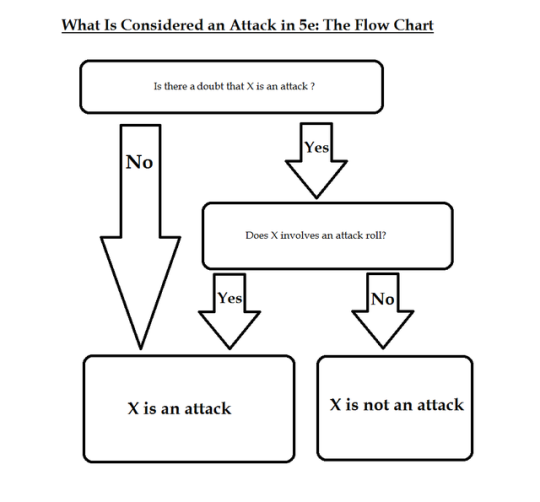Simply adding the clause: "If there's ever any question whether something you're doing counts as an attack,..." does nothing to change the words that follow. Those words still mean what they mean.
We know what was intended (because JC told us), but what was intended is not what is written. What is written after the clause does not answer the question in all cases.
You've added the bolded bit. It does not occur in the text. It does not say this. This is interpretation (albeit correct according to JC). But the book doesn't say this.
Spoiler: For UnoriginalNo. This is precisely what I refuse to do: add information that is not given. The PHB does not say that no attack roll implies no attack. I refuse to admit that it does.The Champion's Survivor class feature involves the Champion regaining HPs after being damaged enough. Are you going to argue that it can be blocked by an Antimagic Field because, despite it being never mentioned to be magical, it sure *seems" magical to regain HPs like that?
It's not a false a equivalence. It's exactly the point. I am saying that an eagle might be a skunk or it might not. The rules do not tell us that an eagle is not a skunk. The rules are silent. So we use our brains and the meanings of the words "eagle" and "skunk." We conclude that an eagle is not a skunk.That's a false equivalence. You're not going to debate if an eagle is a skunk because there is nothing saying that the eagle is not a skunk, yes?
Absolutely not. You made one correction, but it is still incorrect.
This is the point of contention. I say it does not say this.
This is not true, and saying "By definition" does not help.So by defintion, even if it is not literally RAW, "X is not an attack" is an option acknowledged by the book, and it is applied to what is questioned to be an attack but does not have attack roll.
Yes. That's the point. This is not what the RAW say.Does anyone deny this?
Spoiler: For smcmikeI also think they did an excellent job. Regardless, they made a mistake here, if JC is correct. Aside form this, there is a long history of "specific beats general" in D&D. they've been writing these types of rules for around 40 years.
This is basically my stance. But also the initial question is totally wrong. It should say: "Is the ability specifically defined as an attack in the rules?"
This is a pretty strong argument against, but I still don't think it succeeds. That part of the text is preceded by: "Whether you're striking with a melee weapon, firing a weapon at range, or making an attack roll as part a spell, an attack has a simple structure." So, if you are doing neither of these three things, the text that follows does not apply.
Spoiler: For MillstoneNobody is arguing that making an attack roll means you are making an attack. (Edit: nobody is arguing against the notion. Sorry for confusion.) We're arguing the converse. There is still no blue to green.Then comes the bit about the converse being true as well. Making an attack roll means you are making an attack.
From blue to green and green to blue. As Unoriginal said a page ago, the RAW is very clear.
Nobody is contending that specific beats general. We are contenting precisely what the general rule is.They can, but for a different reason. When a more specific rule declares something to be an attack, the general rule surrenders.
Spoiler: For qubeThis has nothing to do with specific beats general. I agree that specific beats general. This is a disagreement over what the general rule is.
Precisely. This particular general rule is not exhaustive, though.But when the action doesn't fall under any specific rule, the general rule applies.
A specific rule being all limitting, doesn't mean you get free reign to decide whatever the heck you want, for the other senarios.
That's correct. And the general rule is silent on whether many actions that do not involve attack rolls are attacks.No. We're left with the general situation.
Yes, so we consider whether a human is an ogre mage. We find, in the rules, that humans are not ogre mages. If the rules were silent, we would use our brains to determine whether a human is an ogre mage; because, as yo say, creatures cannot typically turn invisible, so question is whether a human is this specific type of creature.A rule that states ogre mages can turn invisible at will, is silent on if humans can do that or not. They can't, not because "our brains" - but because it's the general rule that creatures can't do this.
But this is not a similar case.
Spoiler: For bid
This is the intention, according to JC. It's still not what the RAW say.
Except grappling is an attack in both senses of the word. It is an attack because it involves an attack roll, and it is an attack because the rules say it is an attack.This is why grappling someone whom you've Hexed does not inflict 1d6 points of damage to them--because it's not an "attack" despite being an attack.
Edit: My bad. It does not involve an attack roll. It is an attack because the RAW say it is an attack.
View Single Post
-
2017-07-20, 12:53 PM (ISO 8601)Banned


- Join Date
- Jan 2015
- Gender

 Re: What is technically considered an attack?
Re: What is technically considered an attack?
Last edited by BurgerBeast; 2017-07-20 at 12:59 PM.




 Reply With Quote
Reply With Quote